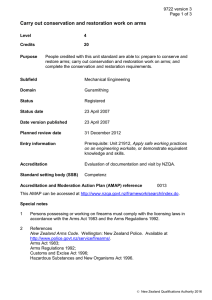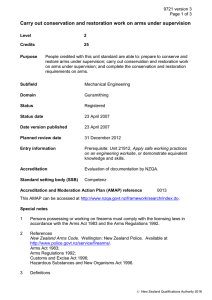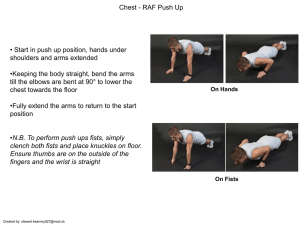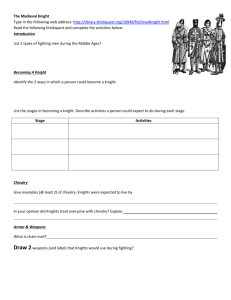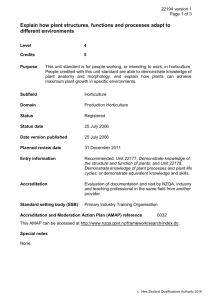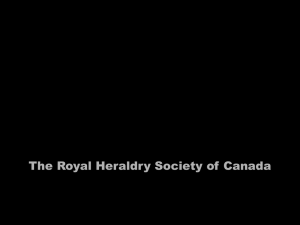9723 Advise on the conservation and restoration of arms
advertisement
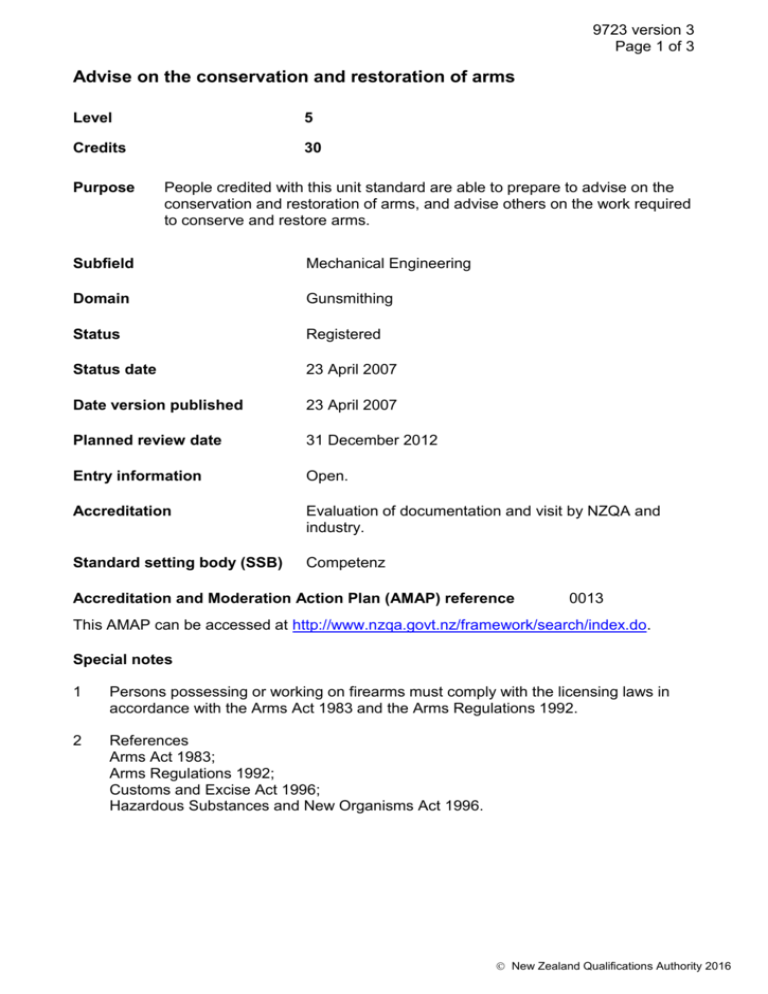
9723 version 3 Page 1 of 3 Advise on the conservation and restoration of arms Level 5 Credits 30 Purpose People credited with this unit standard are able to prepare to advise on the conservation and restoration of arms, and advise others on the work required to conserve and restore arms. Subfield Mechanical Engineering Domain Gunsmithing Status Registered Status date 23 April 2007 Date version published 23 April 2007 Planned review date 31 December 2012 Entry information Open. Accreditation Evaluation of documentation and visit by NZQA and industry. Standard setting body (SSB) Competenz Accreditation and Moderation Action Plan (AMAP) reference 0013 This AMAP can be accessed at http://www.nzqa.govt.nz/framework/search/index.do. Special notes 1 Persons possessing or working on firearms must comply with the licensing laws in accordance with the Arms Act 1983 and the Arms Regulations 1992. 2 References Arms Act 1983; Arms Regulations 1992; Customs and Excise Act 1996; Hazardous Substances and New Organisms Act 1996. New Zealand Qualifications Authority 2016 9723 version 3 Page 2 of 3 3 Definitions Plan refers to the procedures developed to enable the work to be carried out in a logical and safe manner. Worksite procedures refers to procedures and instructions used at the candidate's worksite, and which relate to the safe performance of the work covered by this unit standard. Typical worksite procedures may include supervisor's instructions, health and safety procedures, manufacturers’ instructions, drawings, job specifications, job breakdowns, assembly instructions, and test procedures. 4 Range Evidence is required for a range of arms containing parts made from ferrous and non-ferrous metals, wood, textiles, natural products (eg skins, horn, bone, rubber), composites, surface coatings. Elements and performance criteria Element 1 Prepare to advise on the conservation and restoration of arms. Performance criteria 1.1 Knowledge of conservation and restoration techniques and procedures is identified and related to the preservation of arms. 1.2 Types of damage or deterioration to arms are identified and related to the preservation of arms. Range 1.3 types of damage – age, wear, moisture or water, foreign matter. Plan for conservation and restoration work on arms is prepared in accordance with worksite procedures. Element 2 Advise others on the work required to conserve and restore arms. Performance criteria 2.1 Others are informed on the conservation and restoration requirements of arms relative to their condition. Range 2.2 includes – history documentation together with photographic record. Others are advised on the specific requirements to conserve and restore arms in accordance with the prepared plan. Range includes – the methods, processes, and materials to be used. New Zealand Qualifications Authority 2016 9723 version 3 Page 3 of 3 Please note Providers must be accredited by NZQA, or an inter-institutional body with delegated authority for quality assurance, before they can report credits from assessment against unit standards or deliver courses of study leading to that assessment. Industry Training Organisations must be accredited by NZQA before they can register credits from assessment against unit standards. Accredited providers and Industry Training Organisations assessing against unit standards must engage with the moderation system that applies to those standards. Accreditation requirements and an outline of the moderation system that applies to this standard are outlined in the Accreditation and Moderation Action Plan (AMAP). The AMAP also includes useful information about special requirements for organisations wishing to develop education and training programmes, such as minimum qualifications for tutors and assessors, and special resource requirements. Comments on this unit standard Please contact Competenz qualifications@competenz.org.nz if you wish to suggest changes to the content of this unit standard. New Zealand Qualifications Authority 2016

